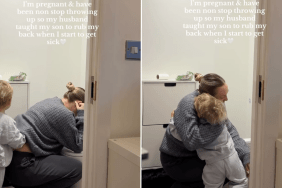I’ve never had a flu shot. I’ve always thought of the flu as a mostly benign disease, no more dangerous than a cold. And most of the time, it’s true that the flu is nothing to worry about.
But a few years ago, a particularly severe flu season made me reconsider my nonchalant attitude. I’d heard before then that the flu could be dangerous, but I’d never seen it firsthand. That year, two of my friends had babies hospitalized for a week, and an elderly man in my neighborhood died. That was the first time I’d known anyone personally who suffered a severe case of the flu.
Both my kids were born in winter, right in the middle of flu season. I didn’t get the flu shot during either pregnancy. But if I’d known when I was pregnant what I know now about how dangerous the flu can be, I might have considered getting vaccinated — and according to most experts, I should have.
Is it Safe to Get a Flu Shot While Pregnant?
There’s a lot of concern about the safety of vaccinations, and that was definitely a factor for me in choosing not to get the shot when I was pregnant. But the flu vaccine is approved for use during any trimester of pregnancy, and it can actually help protect your baby, too. The Center for Disease Control and Prevention recommends a flu shot for anyone who is pregnant during flu season (typically October through March).
How Does the Flu Shot Protect My Unborn Baby?
Antibodies from the vaccine are passed to your unborn baby to help protect the child for up to six months after birth. Newborns are at high risk for flu and related complications, but babies can’t get the flu vaccination themselves until they’re six months old. So if you get the shot while you’re pregnant, your baby will have the antibodies from your shot during those vulnerable first few months.
And if you’re vaccinated during pregnancy, you can also pass antibodies to your baby through breast milk. It takes about two weeks for your body to start producing antibodies after you get the flu shot.
How Should a Flu Shot be Administered during Pregnancy?
The flu vaccine comes in two forms:
- an injectable form (aka the flu shot)
- a nasal spray.
The nasal spray flu vaccine is not recommended for pregnant women because it is formulated from a live virus. The flu shot, however, is made from an inactivated virus, making it safe for mom and baby.
What are the Risks of Not Getting a Flu Shot?
Like young children and the elderly, pregnant women are at higher risk for flu complications. That’s because pregnancy puts extra stress on your heart and lungs and can weaken your immune system. These factors increase your risk of getting the flu and of developing serious complications like pneumonia or breathing problems. Flu during pregnancy can also increase the risk of premature birth, low birth weight, and even miscarriage.
A study released by the New England Journal of Medicine, researchers at the Norwegian Institute of Public Health examined over 117,000 pregnant women and found that women who were not vaccinated and contracted the flu were at almost two times the risk for fetal death than vaccinated mothers.
More Resources
Many prominent medical professionals urge pregnant women to safeguard against the flu, including Dr. Roger W. Harms, the Mayo Clinic medical editor-in-chief and obstetrician. Read his postition here.
I don’t regret skipping the shot, since neither of my kids got sick in their first flu season. I was fortunate enough to be able to keep both of them home and avoid exposure to germs till they were well past the newborn period. But if you’re due this winter, getting the vaccine is a good idea — to protect both you and your baby.
More Pregnancy Health Advice:
- 6 Crucial Questions Every Pregnant Woman Should Ask Her Ob-Gyn
- Preeclampsia Signs That Often Get Overlooked
- What Are the Symptoms of Placenta Previa & How Is it Treated?
Photo: Getty








